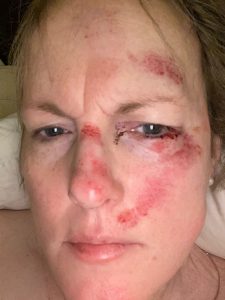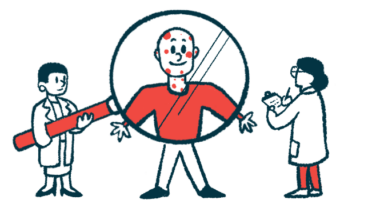Recovery Is a Long Road Following My Concussion

When I was diagnosed with Lambert-Eaton myasthenic syndrome (LEMS) in 2016, I quickly learned that I would need to educate everyone else about my ultra-rare disease. The need to educate people about LEMS is why I started writing.
Last month, I fell and suffered a concussion. Looking back, I realize that I was uneducated about what someone experiences with a traumatic brain injury (TBI). Everyone knows that a concussion involves an injury or jolt to the head, and most people have heard the term concussion because they happen frequently. What I have learned is that even when a medical condition isn’t rare like LEMS, one still might be unprepared for the symptoms.
I would have thought that concussions caused by sports injuries, car accidents, or military combat zones would be far worse than the concussion I experienced. But according to the Centers for Disease Control and Prevention, falls were the leading cause of TBIs in 2014, accounting for 48% of TBI-related emergency department visits. Falls also were the leading cause of death that year for people 65 and older. When I fell, I was knocked out for nearly an hour before regaining consciousness, thankfully on my own.
I’ve learned a few things in the past month while recovering from my concussion, including the following:
A concussion makes brain fog seem like a walk in the park.
I’ve dealt with both physical exhaustion and brain fog for decades with my many chronic illnesses. I even suffered scary brain fog when my intravenous immunoglobulin treatment was delayed last summer. However, the exhaustion my brain felt with a concussion was like nothing I’ve experienced before.
Sleep is the only remedy for this invisible injury.
During the first week, it seemed as if all I did was sleep. It wasn’t restless sleep, either. I slept so long and hard that I would wake up hours later wondering what day it was. The weather in Maine, where I live, was finally turning to spring, and I wanted to be outside. But all I could do was feed myself and my pets and sleep for about 20 hours a day. Slowly, I’ve been able to stay awake more, but I still need recovery naps after reading or writing.
Thinking is exhausting.
After my fall, I couldn’t think deeply about anything, nor did I want to. My only thought was, “I couldn’t care less,” which was disconcerting because I usually care too much! However, during this period, the world outside my four walls didn’t matter. Actually, most things inside my four walls didn’t matter either.
Communication becomes a burden.
Communication was exceedingly difficult. I responded to texts and emails with one-word answers or nothing at all. I couldn’t read, process, or respond to much of anything that came at me.
Verbal communication was exhausting. I tried talking to friends and family when I couldn’t respond via text or messenger, but processing the words coming at me was overwhelming. I ended many phone calls in a few minutes and then would go to bed for a long recovery nap.
Cognitive energy is nonexistent.
What scared me the most was my inability to read or write. Thanks to the coronavirus pandemic, I have all kinds of time to read the stacks of novels scattered around my house. But reading a chapter would cause a major headache in the front of my head, where I landed when I fell. The thought process behind writing this column disappeared completely for a few weeks as well. My brain was in a state of nothingness.
About four weeks after my accident, I woke up with a new column idea in my head. This was when I knew I finally had made it past the worst of my concussion’s symptoms. Having the thought process to write gives me hope that my concussion will soon be a part of my past. I still need recovery naps after writing, though.
My fall was caused by a vasovagal syncope episode. I now know how to recognize the symptoms and to sit on the ground or crawl instead of trying to walk if they happen again.
If LEMS has caused you balance issues, I encourage you to discuss with your provider using a walker or other mobility aid rather than risking a serious fall.
There is nothing scarier than when the brain no longer acts like the one we’ve had our entire life.
***
Note: Lambert-Eaton News is strictly a news and information website about the disease. It does not provide medical advice, diagnosis, or treatment. This content is not intended to be a substitute for professional medical advice, diagnosis, or treatment. Always seek the advice of your physician or other qualified health provider with any questions you may have regarding a medical condition. Never disregard professional medical advice or delay in seeking it because of something you have read on this website. The opinions expressed in this column are not those of Lambert-Eaton News or its parent company, Bionews Services, and are intended to spark discussion about issues pertaining to Lambert-Eaton myasthenia.








Deborah Schwartzkopff
Another TBI coming to light is around the use of electroshock or ECT. The California courts have proved brain injury outcomes from this electrical mechanism of trauma. There is a now national suit around the untested devices used in this procedure. Medical malpractice firms are also interviewing for suits as informed consent is fallible and material risk of brain injuries is missing. No FDA testing of procedure or device for safety or effectiveness. Billions involved annually in US alone. Cover ups for decades coming to light. See ectjustice and Life After ECT. Book by Linda Andre called Doctors of Deception.
Dawn DeBois
Hi Deborah,
First, please accept my apology for delaying in response to your comment. I'm two months out from my concussion and finally am able to engage in "discussion" or online communication better without it being overwhelming.
I cannot even imagine the suffering from electroshock therapy. I know it was used to treat behaviors that society wanted to have an instant fix to instead of treating the thought process that was behind the behaviors with therapy, etc. Of course people's behavior changed after having ECT! My realization of how traumatic it is to have your entire "being" be jarred has me feeling incredibly sad in the depths of my soul for what all of those patients went through. If you were one, or a loved one suffered from such treatment, I am so incredibly sorry.
Erin
Thinking of you as you continue to heal from your concussion.